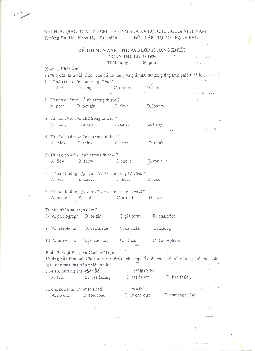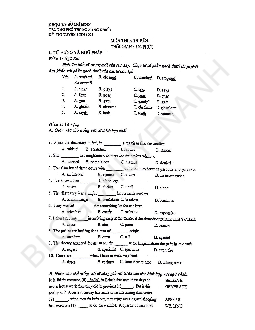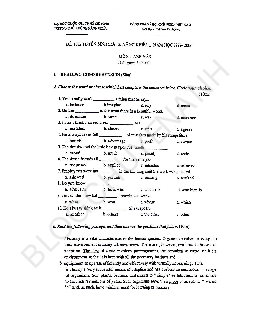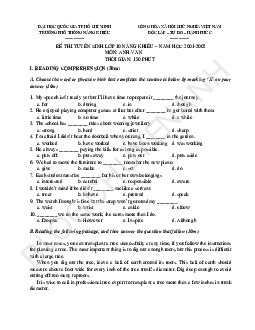








Preview text:
SỞ GIÁO DỤC VÀ ĐÀO TẠO KỲ THI TUYỂN SINH VÀO LỚP 10 THPT
QUẢNG NGÃI NĂM HỌC 2018-2019 Ngày thi: 06/06/2018 Đ Ề CHÍ NH THỨC
Môn: Tiếng Anh (Hệ chuyên)
Thời gian làm bài:150 phút
(Đề thi này gồm 07 trang. Thí sinh làm bài trên PHIẾU TRẢ LỜI) A/ LISTENING (2.5 pts)
PART 1.(0.6 pt) Questions 1-6
You will hear Sarah Brown talking about her work as a television weather forecaster.
For each question put a tick () in the box. Write A, B, or C on your Answer Sheet.
1/ How long has Sarah worked as a weather forecaster? A. two years B. seven years C. thirty years
2/ What does Sarah say about her job?
A. She sometimes has to work at night.
B. She enjoys getting up early.
C. She works ten or twelve hours a day.
3/ When Sarah does a weather forecast,
A. she prepares it in advance.
B. she sometimes forgets her words.
C. she worries about making a mistake. 4/ Sarah’s husband
A. works on the same days each week.
B. wants to move nearer his work.
C. spends a lot of time travelling.
5/ Sarah is pleased because she
A. has got her pilot’s licence.
B. taught her husband to play tennis. C. took part in a long race. 6/ A man in India wanted A. to meet Sarah’s family. B. a photo of Sarah.
C. to receive a letter from Sarah.
PART 2.(0.7 pt) Question 7-13
You will hear a radio talk about holidays in Northumberland. For each question, fill in
the missing information in the numbered space on your Answer Sheet.
HOLIDAYS IN NORTHUMBERLAND Useful Information
- Read Peter Green’s book called “ (7) …………… around Northumberland ”, useful for
planning (8)………………… . 1
- Lots of things to see, for example (9)………………….. .
- Accommodation in flats, hotels, cottages or bed and breakfast places.
- Best time to go is (10)…………………. . Bike Hire - One week – £35
- Two weeks – (11) £ ………………... Local Events
- June – Food Festival
- August – International Festival of (12)…………………
National Park Activities - Guided walks - Photography
- (13)……………………
PART 3.(0.6 pt) Questions 14 – 19
You will hear a conversation between a girl called Julia and her father, about choosing a
course at university. Decide if each sentence is correct or incorrect. Write (A) for correct
sentences and (B) for incorrect sentences on your Answer Sheet. A B
14/ Julia wants to choose a course as soon as possible.
15/ Julia’s father thinks that studying business may be boring.
16/ Julia’s father believes Julia’s friend is making the wrong choice.
17/ Julia’s father thinks she might find studying business too difficult.
18/ Julia is confident about her maths.
19/ Julia is keen to consider her father’s suggestion.
PART 4.(0.6 pt) Questions 20 – 25
You will hear two friends, a boy, Rolf, and a girl, Maria, talking about the jobs they
would like to do in the future. Decide if each sentence is true or false. If it is true, write
(T) for TRUE. If it is false, write (F) for FALSE on your Answer Sheet. TRUE FALSE
20/ Maria would like to travel a lot as part of her job. … …
21/ Maria is confident she will be able to work for an airline. … …
22/ Rolf intends to do a job connected with his degree. … …
23/ Maria and Rolf agree it is important to have a good salary. … …
24/ Maria hopes to work for several different employers. … …
25/ Rolf ’s ambition is to manage his own company one day … … 2
B/ READING COMPREHENSION (2.5 pts)
PART 5.(1.0 pt) Questions 26- 35
Read the text below and choose the correct word for each space. The History of Film
The world's first film was shown in 1895 (0)___ two French brothers, Louis and Auguste
Lumiere. Although it only (26) ___ of short, simple scenes, people loved it and films
have (27)___ popular ever since. The first films were silent, with titles on the screen to (28) ___ the story.
Soon the public had (29) ___ favorite actors and actresses and, in this (30) ___ the first
film stars appeared. In 1927, the first 'talkie', a film with sound, was shown and from then
on, the public (31) ___ only accepted this kind of film.
Further improvements continued, particularly in America, (32) ___ produced 95% of all
films. With the arrival of television in the 1950s, (33) ___ people went to see films, but in
(34) ___ years cinema audiences have grown again. More countries have started to
produce films that influence the film-making industry and there are currently (35) ___ national film industries. Example: 0. A. by B. in C. from D. at Answer: 0. A 26/ A. consisted B. contained C. belonged D. held 27/ A. gone B. been C. made D. kept 28/ A. join B. read C. explain D. perform 29/ A. your B. his C. our D. their 30/ A. reason B. way C. method D. progress 31/ A. had B. have C. having D. to have 32/ A. who B. where C. when D. which 33/ A. other B. each C. fewer D. any 34/ A. recent B. now C. modern D. present 35/ A. many B. lots C. much D. plenty
PART 6.(1.0 pt) Questions 36-45
Read the text and complete the notes. MOBILE PHONE ETIQUETTE
Etiquette is a code of behavior that allows people to follow the standards accepted in
society. Although these rules can change from country to country, many similarities can
be found. Many of the manners are based on three standards: health, courtesy, and
cultural norms. It is through these that we develop the customs and habits of a society.
Etiquette # 1: This is where you have to think more of others than yourself. Don't think
of all those times that you had to suffer people talking loudly on the phone in the cinema,
on the train, in the queue at McDonalds, in front of or behind you. Simply imagine all the
ways other people will find you annoying if you use your mobile phone there.
Etiquette # 2: The good thing about people is that sooner or later someone will tell you
that you are annoying them. Their request to stop talking or talk quietly might seem 3
unreasonable but if you really want to be a model mobile phone user just follow their request.
Etiquette # 3: To stop # 2 from happening, and to keep your secrets to yourself then
keep your distance - 3 metres - between you and anyone else when you are phoning.
Etiquette # 4: Even if you are following # 3 you don't need to shout. This just makes it
easier for people to hear you and much easier to annoy them.
Etiquette # 5: Remember, people don't want to hear you talking on the phone so they
certainly don't want to hear the other person either. So don't turn your speaker on!
Etiquette # 6: If you don't want to be talked about, keep your personal details to
yourself. This means that the distance of 3 metres is probably not far enough from evil
and curious listeners. Either save the conversation for later or start using text messaging.
Etiquette # 7: Don't multi-task, it could cost you your life. Don't use the time you are
spending in a queue to phone someone and certainly don't use the mobile phone when
you are driving. In many countries this is illegal but it is also dangerous. American
national data show that mobile phones caused 350 fatal crashes in 2017.
Etiquette # 8: There are many places such as a library, museum, theatre, and hospital
where, hopefully, common sense tells you not to use your phone.
(adapted from Cambridge PET – Cambridge University Press – 7th printing 2007))
*Notes: etiquette (quy tắc ứng xử); code of behavior (chuẩn hành vi); standard (tiêu
chuẩn); cultural norm (quy tắc ứng xử văn hóa); multi-task (làm nhiều việc cùng lúc);
illegal (trái luật pháp); common sense (lương tri); fatal (nguy hiểm chết người).
Complete the notes below, using NO MORE THAN TWO WORDS AND/OR A
NUMBER from the text for each answer.
NOTES ON MOBILE PHONE ETIQUETTE
Etiquette # 1: Don't think about the people you have met using their phone in front of or
(36) ……… you. Stop using your phone if you think people will find it (37) ……… .
Etiquette # 2: Other people will tell you about your phone etiquette. If they don't like it
they might ask you to (38) ……… .
Etiquette # 3: If you want to keep your (39) ……… to yourself then keep (40) ……… .
Etiquette # 4: Even if you are not near anyone that is no excuse to shout. People will still hear you.
Etiquette # 5: Remember that people don't want to hear you and so they definitely don't
want to hear the person you are talking to.
Etiquette # 6: If you really want to keep the conversation between the two of you then
(41) ……… is the best way to keep people from hearing.
Etiquette # 7: Trying to do too many things at once can be a problem. You know that
using your mobile in a (42)……… is impolite and using it in your car could be (43)
……… and fatal. In America, of all car accidents there were (44) ……… fatalities in
2017 because the driver was using a phone.
Etiquette # 8: Finally, if you have any (45) ……… , you should know that talking on
your mobile in a theatre is a big no-no in mobile phone etiquette.
PART 7.(0.5 pt) Questions 46- 50 4
Read the following passage and choose the letter A, B, C or D to indicate the correct
answer to each of the question on your Answer Sheet.
The invention of the electric telegraph gave birth to the communication industry.
Although Samuel B. Morse succeeded in making the invention useful in 1837, it was not
until 1843 that the first telegraph line of consequence was constructed. By 1860, more
than 50,000 miles of lines connected people east of the Rockies. The following year, San
Francisco was added to the network.
The national telegraph network strengthened the ties between East and West and
contributed to the rapid expansion of the railroads by providing an efficient means to
monitor schedules and routes. Furthermore, the extensions of the telegraph combined
with the invention of the steam- driven rotary printing press by Richard M. Hoe in 1846
revolutionized the world of journalism. Where the business of news gathering had been
dependent upon the mail and on hand - operated presses, the telegraph expanded the
amount of information a newspaper could supply and allowed for more timely reporting.
The establishment of the Associated Press as a central wire service in 1846 marked the
introduction of a new era in journalism.
46/ The main topic of the passage is_______ . A. the history of journalism
B. the origin of the national telegraph
C. how the telegraph network contributed to the expansion of the railroad
D. the contributions and development of the telegraph network
47/ According to the passage, how did the telegraph improve the business of news gathering?
A. By adding San Francisco to the network.
B. By allowing for more timely reporting.
C. By expanding the railroads.
D. By monitoring schedules and routes for the railroads.
48/ The author’s main purpose in this passage is to______.
A. compare the invention of the telegraph with the invention of steam-driven rotary printing press
B. propose new ways to develop the communication industry
C. show how the electric telegraph affected the communication industry D. criticize Samuel B. Morse
49/ The word “revolutionized” is closest in meaning to______ . A. destroyed B. revolved C. gathered D. transformed 5
50/ It can be inferred from the passage that_______.
A. Samuel B.Morse didn’t make a significant contribution to the communication industry
B. Morse’s invention did not immediately achieve its full potential
C. The extension of the telegraph was more important than its invention
D. Journalists have the Associated Press to thank for the birth of the communication industry C/ WRITING (3.0 pts)
PART 8.(1.0 pt) The table below gives information about student enrolments at
Bristol University in 1928, 1958 & 2008. Summarize the information by selecting the
main features, and make comparisons where relevant. Write about 100 words.
Bristol University student enrolments 1928 1958 2008 How many new 218 1,046 6,377 students enrolled at the University? What percentage 42% 32% 54% were female? What percentage 58% 68% 46% were male? What percentage 50% 14% 1-2% came from within 30 miles of Bristol? What percentage 5% 6% 28% came from overseas? from 3 countries from 27 countries from 98 countries
(Adapted from Academic IELTS by Mark Harrison)
*Note: to enroll (đăng ký, ghi danh theo học) 6
PART 9. (0.5 pt) Read the passage and write a summary of 100-120 words.
Most people today know about global warming. They know our planet is in trouble. The
weather is changing, the seas are rising and the ice caps are melting. Why is it then that
nobody seems to be doing anything about it? Perhaps they don’t know what to do?
There are lots of things we can do that will help. Firstly, we must stop using chemicals
which destroy the ozone layer. The ozone layer is very important as it filters the light
from the sun. If we didn’t have the ozone layer, the sun’s light would be too dangerous
for us. In addition, we must use public transport instead of cars. Cars produce carbon
monoxide. This is a very dangerous gas which pollutes the air. We must also stop pouring
chemicals and waste into rivers and lakes, as this pollutes the water and kills the plants,
fish and birds which live there. Furthermore, we must stop cutting down trees and
destroying the rainforests. We need trees because they produce oxygen we all need to
breathe. Also, if we cut down trees, we destroy the homes of animals and birds. However,
it will take more than just this to make any real changes.
Government can help, too. They have to make car manufacturers, factories and oil
companies promise to take positive action. They cause most of the pollution and do little
to control it. We can help by writing to politicians and company directors asking them to
reduce this. We can use our vote to elect people who promise to improve the situation
and change things for the better. Nevertheless, if all the factories closed today there
would still be enough carbon dioxide in the air to keep the planet warm for centuries.
Many people believe that whatever we do now is too little and too late. They don’t see
how small actions can improve the situation.
Clearly, it’s going to take a long time for any changes to make a difference, so the sooner
we start, the better. If everyone tries to help, we could make our world a better place, for
ourselves and for the children of the future.
(Cambridge PET - Cambridge University Press-2010) PART 10.(1.5 pts)
Some people consider computer games a harmless relaxation or even a useful
educational tool for school students. Others, however, believe that these games are
having an adverse effect on the students who play them. Discuss both views,
supporting your opinion with specific reasons and examples. Write at least 200 words.
* Notes: educational tool (công cụ giáo dục); adverse effect (hậu quả tiêu cực). ________ THE END _________
* Ghi chú: Cán bộ coi thi không giải thích gì thêm.
SỞ GIÁO DỤC VÀ ĐÀO TẠO KỲ THI TUYỂN SINH VÀO LỚP 10 THPT 7
QUẢNG NGÃI NĂM HỌC 2018-2019
HƯỚNG DẪN CHẤM VÀ ĐÁP ÁN ĐỀ CHÍNH THỨC
MÔN: TIẾNG ANH (HỆ CHUYÊN) A/ LISTENING (2.5 pts)
(0.1 point for each correct answer)
PART 1.(0.6 pt) 1/B 2/A 3/A 4/C 5/C 6/B
PART 2.(0.7 pt) 7/ C/cycling 8/ (my) route 9/ (a) C/castle(s) 10/ (in the) S/spring (time)
11/ (£) 55(fifty five) 12/ M/ music 13/ B/bird(s) watching
PART 3.(0.6 pt) 14/B 15/B 16/A 17/B 18/A 19/A
PART 4.(0.6 pt) 20/ T 21/ F 22/ F 23/ T 24/ F 25/ F B/ READING (2.5 pts)
(0.1 point for each correct answer)
PART 5.(1.0 pt)
26/ A 27/ B 28/ C 29/ D 30/ B 31/ B 32/ D 33/ C 34/ A 35/ A
PART 6.(1.0 pt) (36) behind (37) annoying
(38) stop talking/ talk quietly (39) secrets
(40) your distance (41) text messaging/texting (42) queue (43) illegal (44) 350 (45) common sense
PART 7.(0.5 pt) 46/ D 47/ B 48/ C 49/ D 50 / B C/ WRITING (3.0 pts)
PART 8.(1.0 pt) Describing a table.
The report covering the following points:
✓ Paraphrase the question (0.2 pt) and state the overview (0.3 pt).
✓ Use relevant data from the table to illustrate the main features mentioned in the
overview, making any comparison if necessary (0.5 pt).
PART 9.(0.5 pt) Writing a summary (100-120 words) 8
The summary is required:
✓ not to copy the original sentences/ use one’s own words (0.2pt)
✓ to meet the minimum word limit. (0.1pt)
✓ to refer closely to the main ideas of the passage. (0.2pt)
The summary should cover 3 main points:
✓ about the consequences of global warming (i.e. weather changing, seas rising, …)
✓ things we can do to help solve the trouble (i.e. protecting the air, land/ water)
✓ things the government can do to reduce pollution (i.e. taking measures/ enforcing
laws to cut down on polluting activities, raising the public’s awareness/
encouraging using public transport, …). Sample summary:
Nowadays the Earth is facing the challenge of global warming, with lots of natural
unusual changes. To deal with these problems, we have to protect the atmosphere,
the air, the land, the water, the flora and fauna on the globe from being destroyed
or contaminated, with possible solutions such as banning air pollutants, ceasing
deforestation and preserving wild life habitats. We can also ask and encourage the
government as well as relevant industrial companies and producers to be more
responsible. They ought without delay to have their active contributions to bring
about positive changes on this planet, making it more liveable for today and for the
coming generations. (108 words)
PART 10.(1.5 pts)
Some people consider computer games a harmless relaxation or even a useful
educational tool for school students. Others, however, believe that these games are
having an adverse effect on the students who play them. Discuss both views,
supporting your opinion with specific reasons and examples. Write at least 200 words.
Marks given to Part 10 are based on the following criteria:
1. Task achievement: (0.5pt)
Meet task requirements; with relevant and reliable explanations, examples, evidence, personal experience, etc.
2. Organization: (0.5pt)
- Ideas are well-organized, presented with coherence, cohesion, and unity;
-The essay is well-structured (Introduction presented with clear thesis statement/
Body paragraphs written with unity, coherence, and cohesion/ Each body paragraph
having a topic sentence and supporting details and examples when necessary).
-Conclusion (main points/ prediction/ recommendation/ consideration, personal opinion).
3. Language use, punctuation and spelling (0.5pt) _______ THE END_______ 9




